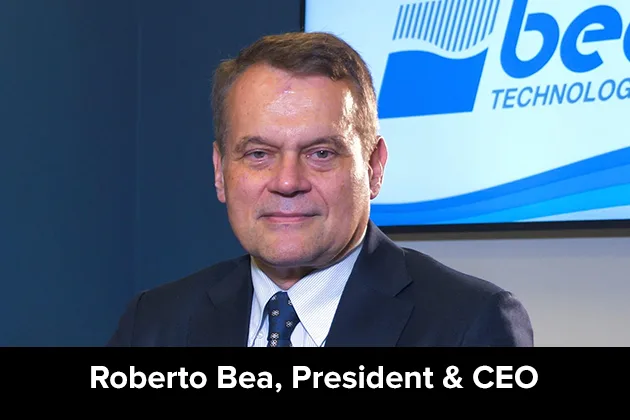Since the last decade, innovation has taken a revolutionary turn, penetrating through all aspects of business, the economy, and our daily lives. In an era where every business is leveraging cutting-edge technologies to craft world-class innovative solutions, the filtration industry has also embraced this change. BEA Technologies S.p.A. in Italy has been one of the industry leaders that has focused on developing filtration solutions through cutting-edge technologies tailored to meet the diverse demands of the Food & beverage, pharmaceutical, medical, and general industries worldwide.
As The CEO Views honors BEA Technologies S.p.A. with the title of one of the “Most Innovative Companies to Watch 2025,” Roberto Bea, the President and CEO, sat down with us to share the company’s journey to the world of innovation.
Embracing Success
Originally founded by Mr. Aldo Bea in 1961, BEA Technologies dealt with filtration applied to protect industrial instrumentation at the outset. However, the filtration business was constantly increasing, even in the Food & Beverage, Medical, and Pharma industries. Following that increased demand, the company created a conditioned area in 1981 for producing filters suitable for food & beverage and pharma applications. In 1996, a new, larger “clean room area” was added, which was later restructured in 2011 to increase the surface area. Besides that, BEA Technologies was also expanding beyond Europe in the world. “Actually, we are selling 50% of our filter production to many customers outside Italy,” adds Roberto.
Mastering the Field
BEA Technologies has mastered the field of purification, as can be seen in the “PURIFICATION CONTROL TECHNOLOGY.” Currently, the company is developing specific filtration solutions to retain and separate different types of contaminants, including microorganisms and bacteria. This is being done to provide the quality and purification grade required by many products.
A Tale of Technical Expertise
BEA Technologies started its internal Laboratory and R&D department to develop its technical expertise in filtration and purification for various applications and industrial processes. In its Laboratory, the company is equipped to run different types of performance tests on filters, including the “Bacteria challenge” to verify the effectiveness of BEA membrane filters in guaranteeing the retention of bacteria and different microorganisms and even the retention of Endotoxin in liquid solutions of pharmaceutical use. The filters and filtration systems are designed for food & beverage, medical, pharmaceutical use to chemical, petrochemical, refinery, and compressed air and gas purification applications.
Rolling with the Punches
Rising above challenges is like climbing a steep hill. Similar to any other business in an industry, BEA Technologies has also encountered its own share of industry challenges. As shared by Roberto, recently, an increase in the demand for energy consumption and concern about reducing CO2 emissions have been observed.
In response to this growing demand and concern, BEA Technologies has developed some Automatic Filtration Systems, such as DUOMATIC, FILTROMATIC, and MAGNEXFLO. These incorporate filter elements that are automatically cleanable and regenerable to make them usable for a longer time and reduce the number of exhausted filter elements needed by customers to send to waste and the corresponding savings on CO2.
Revolutionizing Filters and Automatic Filtration
BEA Technologies is well-known for giving attention to new and emerging technologies and filtration materials to study the incorporation of the filters and filtration systems designed by the company. This approach of BEA Technologies allows it to be competitive and propose new filter solutions to some of the most critical filtration problems of its clients. “Our MAGNEXFLO filtration systems, for example, are able to filter products and solutions of higher viscosity, separating all aggregates and particles, to make them clean and usable,” states Roberto.
Fostering Innovation
Innovation lies at the core of BEA Technologies, and technology is at the forefront of this innovation fostered by the company. It has engineered ‘Nanofiber’ technology to be used as a filtration material. With this advancement in technology in filtration, filter elements containing nanofibers are now easily cleanable and regenerable to satisfy the needs of the food & beverage industry.
The food & beverage industry is in need of regenerable filter elements, which can be used multiple times before they exhaust. The nanofiber material is designed to retain even yeast and other microorganisms. In driving innovation further, BEA Technologies is planning to maintain a competitive advantage by investing in new technologies to better satisfy the future requests of customers.
Positioning in the Future
BEA Technologies knows that there is a moving trend to transform the pharmaceutical industry, which is increasing investments in “Biomanufacturing.” The team at BEA Technologies is actively studying and testing to see which new types of filters and capsules will be required in the different processes of biomanufacturing, ensuring the company thrives in the future. In the future, when the customers start these new production processes, the company will make sure they have the requested type of filter. This would make BEA Technologies a preferred choice for an advanced filtration solutions provider across various industries.
Guiding Emerging Entrepreneurs
When asked to share some pieces of advice for young and emerging entrepreneurs, Roberto clarified that their first duty should be to carefully select which type of need or request, coming from the markets, they wish to satisfy, and then check which type of technology is most advised. If the technology to be engineered for their product is easily available, they must find the money to start the business and then organize a focused working team to push forward the project.
“We have purchased a new generation of manufacturing machines and equipment, which can be digitally connected to our mainframe and are capable of transmitting real-time data on production capacity.”










